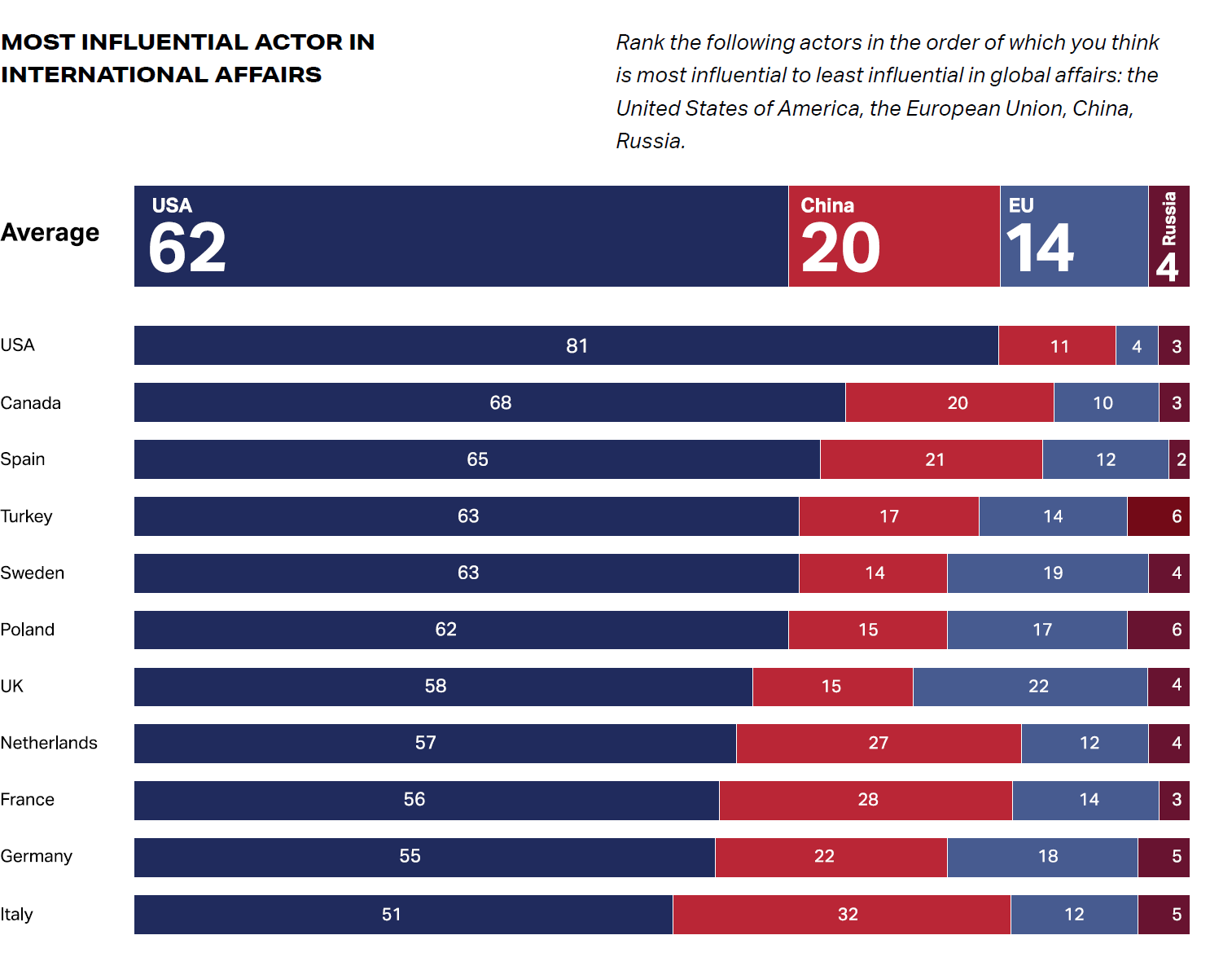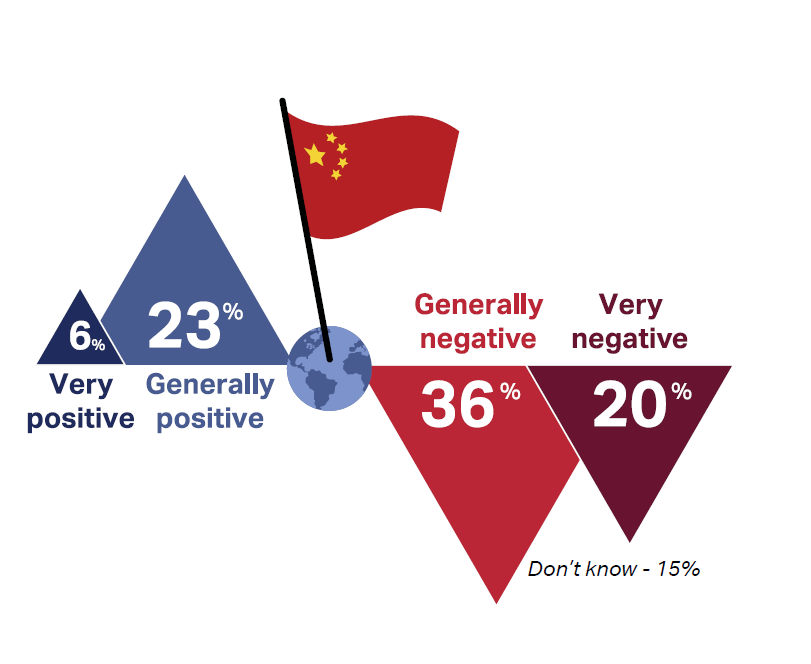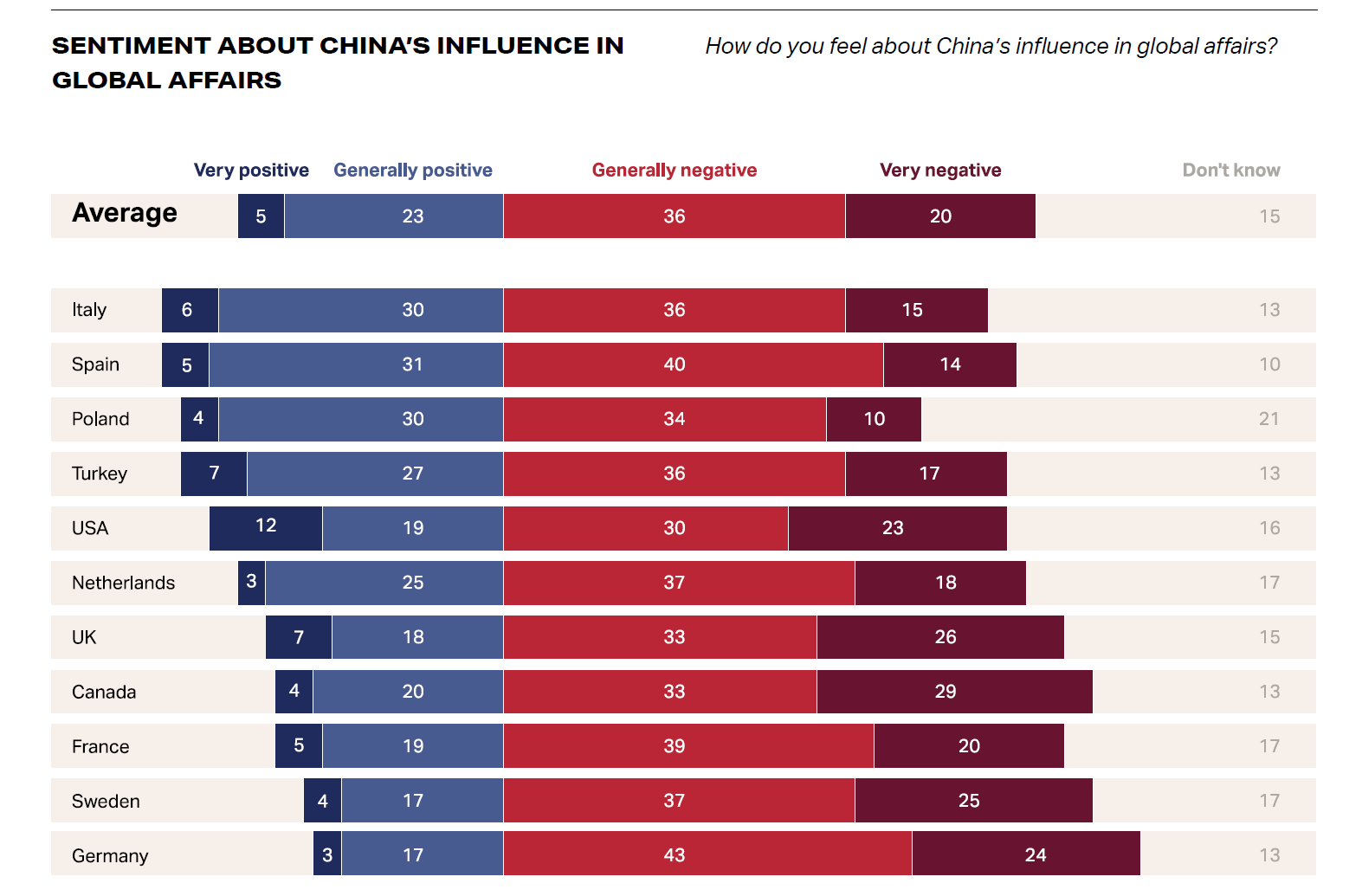On both sides of the Atlantic, China is getting increasingly greater attention. The G-7 Leaders Communique signed in Cornwall last week endorsed cooperating with China on global challenges such as climate change. At the same time, the leaders of the world’s leading democracies called out Beijing for its non-market policies and practices, as well as its transgressions against human rights in Xinjiang and its failure to live up to its pledge to uphold a high degree of autonomy in Hong Kong. That agenda reflects the priorities and concerns of their publics, which hold increasingly negative views about China and its influence in global affairs. New polling confirms this trend and reveals an emerging convergence among American, Canadian, and European publics on China, which is good news for U.S. President Joe Biden and others who seek to strengthen transatlantic cooperation.
Between March and April this year, Transatlantic Trends 2021 conducted by the German Marshall Fund of the United States and the Bertelsmann Foundation surveyed people in 11 countries: Canada, France, Germany, Italy, the Netherlands, Poland, Spain, Sweden, Turkey, the United Kingdom, and the United States. The survey results paint a detailed picture of transatlantic public opinion and attitudes on a host of issues including international security and defense, trade and technology policies, global challenges, and perhaps on the most important question for transatlantic ties, relations with China.
Global Influence of the U.S. and China
Although China is seen by the majority in all countries as the second most influential power in global affairs, its clout is judged as lagging far behind that of the United States. Almost two-thirds of respondents on average consider the United States to be the most influential country (62 percent), followed by China (20 percent), the European Union (14 percent), and Russia (4 percent). Perception of China’s influence held steady compared to last year’s survey, which saw a jump in perceived Chinese influence in global affairs following the outbreak of the pandemic, from 13 percent to 28 percent in France, 12 percent to 20 percent in Germany, and from 6 percent to 14 percent in the United States.
Retaining this post-pandemic bump, China has consolidated its standing as the second most influential global power in the eyes of Germans (22 percent, up 2 points compared to 2020) and French (28 percent, no change compared to 2020). Alongside the French, the Dutch (27 percent) and the Italians (32 percent) are most likely to rank China as the most influential global player, in contrast to Swedish (14 percent), Polish (15 percent), and British (15 percent) respondents.
The shared transatlantic view that China’s influence in international affairs is no match for the United States’ contrasts with surveys of Asian countries, where polling by Singapore’s Institute for Southeast Asian Studies found that Southeast Asian countries see China as the most influential economic power in (76.3 percent) and the most influential political and strategic power in the region (49.1 percent).

Perceptions of China: Partner, Competitor, or Rival?
Even though China is seen as globally influential in all countries surveyed, respondents felt generally negative about China’s influence in global affairs. Negativity regarding China has increased over the last year especially in Germany, rising from 50 percent in 2020 to 67 percent in 2021. Overall, Germans, Canadians (63 percent), and Swedes (62 percent) have the most critical stance on China. In the other countries covered, a bit over half (54-59 percent) of respondents had a negative view of China’s influence.
Does this negative view mean respondents across the Atlantic consider China more as a rival than a partner? Here the results are more mixed. Except for the United States, where one in four respondents (26 percent) views China exclusively as a rival, very few respondents in other countries had such a distinct opinion. However, a majority of those surveyed, especially in Canada and Western Europe, labeled China “more a rival than a partner.” There is a sharp East-West and North-South divide on perceptions of China. While China is primarily perceived as a rival in the U.S. (70 percent), France (62 percent), the U.K. (60 percent), and Canada (58 percent), China enjoys favorable views as a partner in Spain (49 percent), Poland (45 percent), and Italy (36 percent).

Spain also stands out in a recent Pew Survey, which recorded a 9-point jump in positive assessment of Xi’s leadership in 2020, compared to the previous year. These findings are in line with other surveys, including a report published by the European Think Tank Network on China (ENTC) this year, which shows that people in Poland, Italy, and Spain have a more positive assessment of the economic partnership and perceived investments from China. Italy was the first European country to be the destination of China’s “mask diplomacy,” which had a positive effect on Italians’ perception of China. The ENTC Report also shows that media coverage of China has increased substantially, although 75 percent stories published by Italy’s primary press agency ANSA were taken directly from Xinhua and thus included one-sided, largely positive stories. Similarly in Spain, positive and non-confrontational Chinese diplomacy, in sharp contrast to the wolf warrior approach deployed elsewhere in Europe, seems to have paid off and checked further erosion of China’s reputation.

How respondents perceive Beijing’s influence strongly varies with age. Younger respondents, especially those between the ages of 18-24, had a positive image of China, while negative views dominate in older age cohorts. This trend is consistent across the Atlantic and might indicate a long-term shift in public opinion on China. A striking 83 percent of Americans 55 years and older view China’s influence as negative while among 18- to 24-year-olds, only 39 percent view Beijing’s clout with skepticism. Republican-leaning Americans (63 percent), supporters of the populist Five-Star Movement in Italy (68 percent), the Greens in Germany (81 percent), and the liberal-conservative Moderaterna in Sweden (76 percent) have a more negative perception of China than their compatriots from other political parties.
Government Policies on China
The debate about whether governments should adopt a cooperative or competitive stance toward China has gained momentum across the Atlantic, with the United States leaning more toward competition and European governments still struggling to articulate a coherent China policy. However, there is a consensus among publics across the Atlantic that their governments should adopt a tougher stance toward China, particularly on protection of human rights (61.8 percent), cybersecurity (56.7 percent), and even climate change (55.6 percent), which most governments see as an area of cooperation with China.
A majority of respondents in France (56 percent) thinks their country should adopt a tougher stance on trade with China, while respondents from the U.K. favor a tougher response to China’s territorial expansion, more so than in other countries. Meanwhile, 63 percent of Germans want their government to press China on cybersecurity issues. This is in sharp contrast to the German government’s approach of seeking a middle ground on the question of allowing Chinese companies like Huawei into Germany’s 5G network. U.S. respondents lean more toward a tougher approach on issues around technological innovation, more than in Europe and Canada. Overall, compared to the results of the Transatlantic Trends survey conducted in 2020, support for pushing back against objectionable Chinese policies has risen significantly, especially in France, Germany, and the U.S. On cybersecurity and digital innovation, backing for a tougher approach vis-à-vis China increased by more than 10 points in all three countries.
Transatlantic Cooperation on China
Despite growing convergence and calls for tougher government policies, China does not figure as the top issue for transatlantic cooperation in the way that climate change (37 percent), global health (36 percent), and terrorism (32 percent) do. Only 15 percent of respondents think China is an important issue. However, there is significant support for greater transatlantic cooperation on technology as an effective way of competing with China. More than half of respondents in all countries except Turkey think that cooperation will help allies compete. The highest percentages holding this view (58-62 percent) are in France, Poland, the United States, the U.K., and Germany.
Through a combination of purchasing foreign companies, stealing intellectual property, and domestic innovation driven by state subsidies, China is emerging as one of the world’s tech champions. The G-7 Leaders Communique welcomed the U.K. Presidency’s initiative of a “Future Tech Forum” in September 2021 with the support of the OECD that will convene like-minded democratic partners to discuss the role of technology in supporting open societies and tackling global challenges. Citizens on both sides of the Atlantic believe that priority should given to teaming up on technology, with more than two-thirds agreeing that cooperation will help or somewhat help the allies stay competitive. Especially in Spain (67 percent) and Sweden (66 percent), respondents deem transatlantic cooperation on technology to be an at least somewhat effective way to successfully compete with China.
Political orientation doesn’t appear to be a consistent factor shaping views on transatlantic cooperation on technology. Support is higher among Democrat-leaning (68 percent) than Republican-leaning Americans (58 percent), as well as among French and Polish respondents aligned with the current governing parties (73 percent among supporters of La République en Marche; 76 percent among supporters of the PiS in Poland). In other countries, German Greens (76 percent), and Italians supporting the right-wing conservative Fratelli d’Italia (64 percent) are confident that transatlantic cooperation on technological issues is the way to compete with China.
There is also potential for increased transatlantic cooperation on stepping up pressure on China in the areas of human rights, climate change, and cybersecurity. A majority of respondents in all countries shows strong support for their governments to adopt a tougher stance toward China on those issues. Across all countries polled, 62 percent back a tougher approach toward Beijing on human rights, 57 percent on cybersecurity, and 56 percent on climate. There is a gap, however, in the priorities across the Atlantic on climate, where only 46 percent of American respondents favor a tougher approach compared to roughly two out of three respondents in France, Sweden (each 65 percent), Germany (63 percent), Spain (64 percent), and Italy (60 percent).
China policy will be a crucial and likely contentious issue in transatlantic relations. The Biden administration has started its outreach to integrate Europe into its policy of working with a network of allies and partners to compete with China. Europe has responded cautiously. While many European governments recognize the need for a common transatlantic approach to China, there is as yet no agreement on priority areas for collaboration or how confrontational policies should be. As policy makers across the Atlantic wrestle with crafting a common approach to dealing with China-related challenges, they should be mindful of the growing convergence between American and European publics’ perceptions of China and its role in the world. With public support for transatlantic cooperation on China-related challenges, particularly in areas like technology, at historical highs, there is a strong foundation for substantial cooperation across the Atlantic.
































